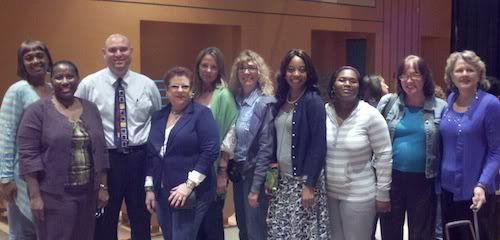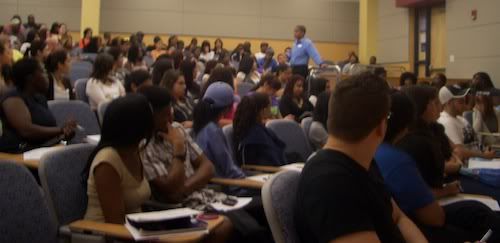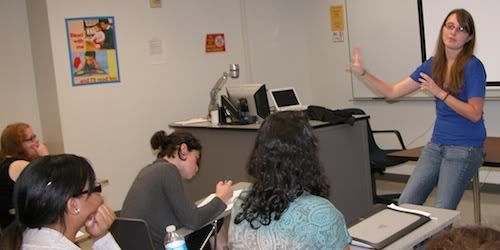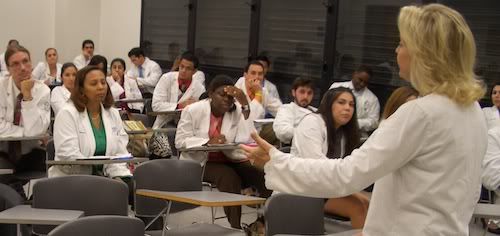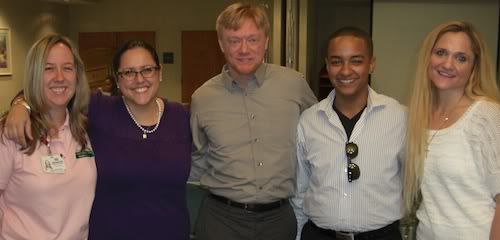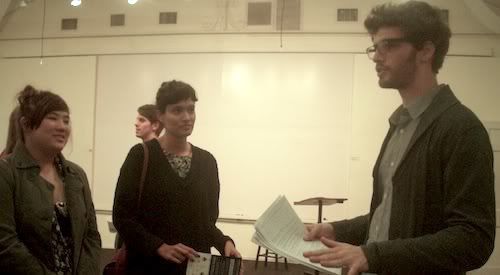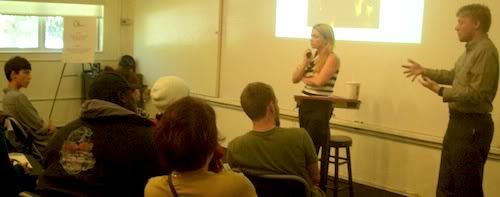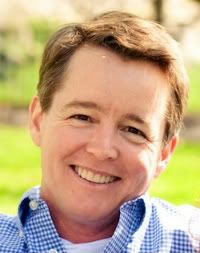 |
| Mel Wymore. |
I have a close friend (and ally) who calls us "the giblets," (GLBTQs). It’s kind of funny, but she makes a rather stirring point. Sometimes we work so hard to identify ourselves, we end up in a box more isolating than where we started. I’m not going to talk about the labels we often confuse and misuse; I’m going to talk about what it means to be and to belong.
First, I want to begin by thanking all of you for being here, for taking the time on a Wednesday night to acknowledge your commitment to justice and equality in the workplace. You are leaders in industry who have fought and won righteous battles. You have my admiration and also my deep gratitude.
When I was a baby tomboy, my parents didn’t tell me anything was wrong. In fact, they didn’t really tell me I was a girl. Mrs. Parker did that. On my first day of pre-school, she insisted that I go play dolls with the other girls (blech!) while the “boys” frolicked outside in the mud. I remember watching them through the window longingly, achingly.
But the message was clear. I would have to learn how to “be” a girl... So I dropped out of pre-school. Thanks to understanding parents, I got a glorious extra year without Mrs. Parker, or Mrs. Peacock, or Mrs. DeVault, or Susy Sanderson, the smartest, sparkliest, prettiest girly girl in school. But I never shook the feeling that I just didn’t belong.
In our culture, belonging is a binary proposition. One is either black or white, masculine or feminine, straight or gay, liberal or conservative. Yes, there is a vast middle ground, and an infinite number of clubs to join, but belonging seems to be given more by what we are not by who we are. If you want to belong to the norm, simply disavow that you are different. Just bury it.
By middle school, I had learned to fit in. On a minimum acceptable number of days (one was always photo day), I sacrificed my striped pants and matching polo shirt for a plaid dress. Life became largely a matter of appearance, performance, and compromise. Fitting in was all that mattered. I appeared to be a happy camper, and I actually believed it myself.
When we strive to belong to any group, we often park a part of ourselves at the door like an inconvenient younger sibling. Rather than risk exclusion, we turn our backs on what makes us whole and complete, sometimes without even noticing.
Strangely, between the ages of 16 and 24, I had 10 car accidents and totaled 6 cars. They were all blindsides. I was so far removed from myself, I thought there was a problem with my peripheral vision. The notion that I was engaged in reckless, death-wish-type driving never crossed my mind. I went to driving school, moved from Arizona to New York, married a successful banker, spawned two beautiful kids, and became an entrepreneur and PTA mom. I was a paragon of fitting in, living out the American Dream.
It wasn’t until I was 35, and mysteriously depressed, that I began experiencing another series of blindsides. This time, they came from the inside out, like a chick emerging from its egg one crack at a time. When I finally sprung the shell, my perfect life crumbled around me. That’s when my real journey began.
As a newly hatched lesbian mom, I challenged myself to prize authenticity over social agreement. It was not easy. I could reliably count on people asking why I would jeopardize the well-being of my children for the sake of my own self-indulgent self-expression. I became acutely aware of how afraid we are, all of us, of being other, of showing ourselves. It’s time to break the chain.
I came out a second time 3 years ago. We tend to confuse sexual orientation with gender identity. As it turned out for me, same sex relationships only exacerbated the deep discomfort I had always felt with my body. So I began to transition. This time, however, I went big. I literally moved physically across the gender spectrum in front of the world, narrating along the way, not to embellish my own story, but as an invitation for everyone to break through their own barriers to full self-expression.
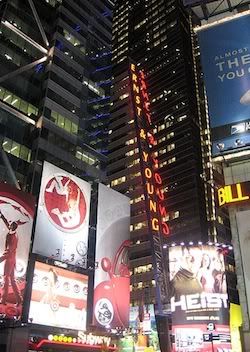 |
| Ernst & Young building, Times Square. |
1. Challenge the mental models that shape our world.
From the get-go, we are born into a paradigm that separates us. What’s most often the first question asked of any expecting mother? ["Is it a boy or girl?"] As we grow up, we continue collecting and identifying the two-sided coins of life and how they define us: are we smart vs. “social,” rich vs. poor, fast or slow? Our default frame of reference is almost always us vs. them. The simple, conscious act of replacing our jar of two-sided coins with a jar of multicolored marbles will make room for new conversations, engage who we actually are, and ultimately change the world.
2. Build authentic and inclusive community.
Community is the antidote to the isolation and disconnection we all increasingly feel. Inclusive community does not happen by accident, it happens by design. First, honor and encourage authentic interactions. Occasionally, break from explanations, analysis, or goals to ask ambiguous questions that encourage engagement and self-expression, questions like:
• What possibility can you proclaim for our company that would have the power to inspire you?
• What gifts or perspectives do you still hold in exile?
• What gratitude do you feel that has yet gone unexpressed?
Make sure open answers carry no cost. Safe space is essential. Form small groups, comprised of people across departments and organizational layers, focused on specific projects that serve the well-being of the whole. Start by developing a set of principles that reflect the deep commitments of the group, principles like freedom, equality, unity, or transparency. Allow them to shape and motivate on-going discussion.
 |
| George Washington bridge, NYC. |
Shift the context of discussion: rather than building community defined by its problems, focus on building community defined by its possibilities. You will be amazed by how the conversations change.
Finally, leave no person behind. Invite everyone to participate, observe, or not. Make sure there’s no cost to opting out.
3. Expand your accountability.
Engage everyone in their ownership of the whole, not only within your institution, but in the immediate community around you. So often we ask our corporations to give charity to lands far away, to feed the poor in Bangladesh or cure the ill in the Congo. These are great causes, but shifting our systems of association at home will bring far more to the world. The us/them paradigm disappears through interpersonal connections, not by shipping money overseas.
These all sound like simple suggestions, but they are not easy. Conventional wisdom will resist “touchy feely” engagements. It will require personal risk, courage, and perseverance to make it happen. But it will be worth the effort. I guarantee it will empower your employees, enliven your company, and impact all three of your bottom lines: people, planet, and profit.
Thank you for your time.

